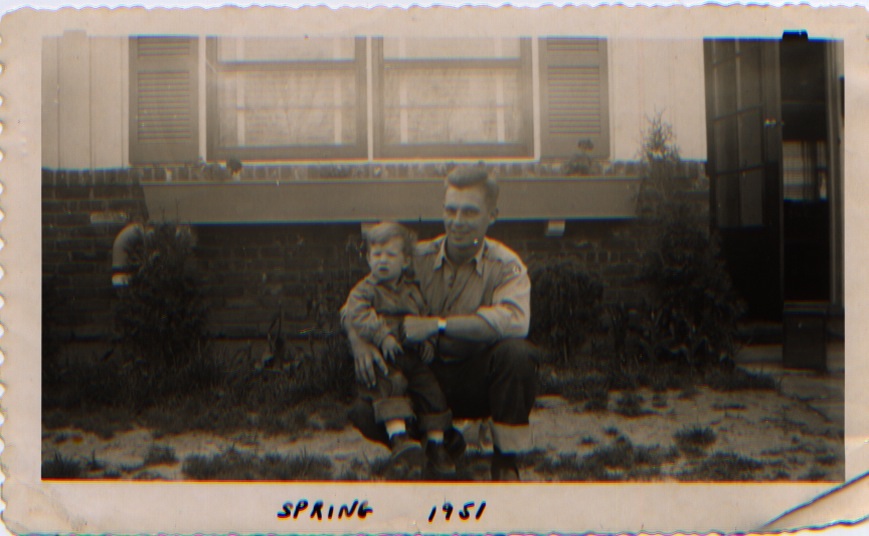NOTE: I first posted this on my blog back in 2011. Figured it was worth bringing back today, as we warm up for the weekend ahead.
–
Dad was the father of seven children, a veteran of World War II who served in the Pacific. After the war, he graduated from Boston University in two and half years, because why in the world would anybody want to waste another minute in school. There was a life to be lived, a brass ring to grab, things to do. Let’s get on with it.
It was a different time, a different generation.

Dad settled with my mother on Long Island, became an insurance man, started having kids rapid fire in the Catholic fashion, built a business. I was the youngest in the family, the baby. On rare weekend days I’d tag along when my father needed to pop into his rented office on Wantagh Avenue for an hour or two. We never specialized in father-and-son type stuff, whatever that was, and I’m sure the word bonding did not apply to relationships back in those days, only glue, but I do recall those trips to his office. Dad’s place of business offered that most wondrous of commodities, office supplies — electric typewriters, staplers, a copier, boxes of paper clips and, best of all, tracing paper.

I marveled at its magical properties. Dad didn’t part with his supply easily, that stuff cost money, so I was thrilled and grateful whenever he brought a stack home. Those are nice memories for me, a lifetime away. I sometimes wonder: Whatever happened to that kid? That boy with the tracing paper? Where’d he go?

From around that time, somewhere in the mid 60’s, another day presses forward for attention. One spring morning we set off together — in the hazy gauze of remembrance, just me and dad — to a farm somewhere. Because dad knew a guy, a customer who had a stable and a few horses. He possessed, in others words, shit to spare. And the price was right.
I must have been about five or six years old at the time, no older. We got to the farm, out east on Long Island probably, and I stood around while my father chatted with the owner of the place. Maybe I looked into the stable, fearfully eyed the horses. Did I want to feed one of them an apple? No, I did not. I was shy, watchful and quiet. Eventually my dad keyed open the car truck, borrowed a shovel, and filled it to the brim with horse manure. I stood by, mystified, awestruck. Trunk full, steam rising, we headed back home, where I watched my father spread the still semi-moist shit around the front lawn. It was good for the grass, he explained. Nature’s fertilizer.

My older brothers and sisters recall those times with profound mortification. Imagine the embarrassment they felt, the acute stabbing horror, especially those of a certain age, when the opinion of one’s peers meant only everything. I can’t say this plainly enough: My brothers hated it when dad spread horse shit on the front lawn — even worse, on hot days it smelled like holy hell, the stink filling your nostrils — and yet my father performed the same ritual every year.
And here’s the thing about my dad, really the essential memory of him. He didn’t care. Alan J. Preller simply did not give a hoot what anybody thought. He never did. He embarrassed us, he ticked off people, annoyed relatives, said what he thought and did what he did. Dad lived on his own terms, remarkably indifferent to opinion. And if that made him impossible at times, well, so be it. He wasn’t trying to please anybody.
My father passed away a few years back, coincidentally enough while spreading fertilizer out on the front lawn in Southampton, where he retired. He had moved beyond horse manure by then, thank God, nowadays they’d hang you in Southampton for that, but there was still no way he was going to push around one of those crummy lawn spreaders. No, dad preferred a Maxwell House coffee can, dipping it into a big bag of fertilizer, sprinkling it imprecisely across the yard with a grand sweep of his arm. And to be honest, it’s more fun that way. Believe me, I know.

There he was out on the lawn, doing what he always did, and that’s when his heart gave out, when he fell, when my father left us.
These days, when I’m particularly infuriating — insensitive, implacable, impossible — my exasperated wife, Lisa, will proclaim that I’m becoming just like my father. I won’t listen to anyone, I’ll just do whatever I want. And as I age, it only gets worse. That’s her complaint. The funny thing is, I always hear it as a compliment.
Happy Father’s Day, folks. A good day to pull some weeds, mow the lawn, tend the garden and then, like my father often did, wander into the kitchen, reach into the bottom cabinet where he kept the bottle of Dewar’s, and announce, “It’s five o’clock somewhere.”

Here’s to you, old man. Cheers and memories.
Miss you!














